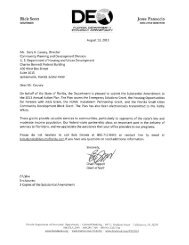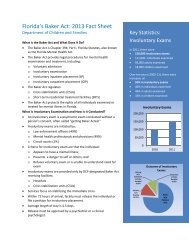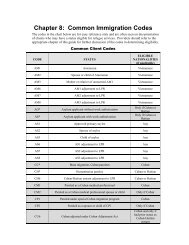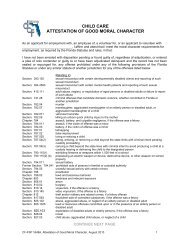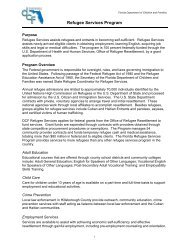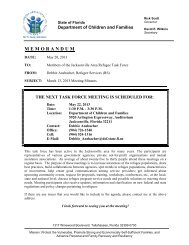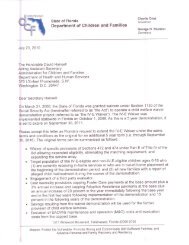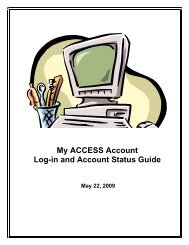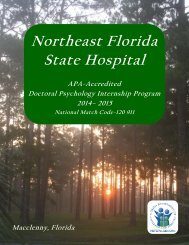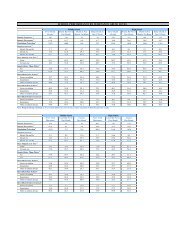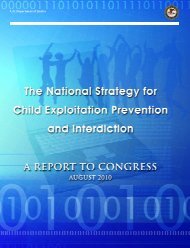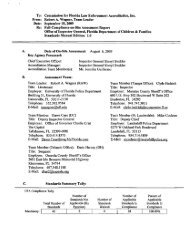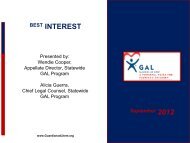Ending Abuse—Improving Lives - Florida Department of Children ...
Ending Abuse—Improving Lives - Florida Department of Children ...
Ending Abuse—Improving Lives - Florida Department of Children ...
You also want an ePaper? Increase the reach of your titles
YUMPU automatically turns print PDFs into web optimized ePapers that Google loves.
Batterer Intervention ProgramsThe year 2006 marks the 10 th anniversary <strong>of</strong> state certification<strong>of</strong> batterer intervention programs and assessorsin <strong>Florida</strong>.The Office <strong>of</strong> Certification and Monitoring <strong>of</strong> BattererIntervention Programs was established by the 1995 Legislaturein order to standardize intervention with batterersand establish statewide minimum standards. Theprimary purpose <strong>of</strong> certified batterer intervention programsis to increase safety for the victims and their children,and to hold the batterers accountable for theirviolence. The <strong>Department</strong> <strong>of</strong> <strong>Children</strong> and Familiesis responsible for the promulgation <strong>of</strong> the minimumstandards including the certification and monitoring <strong>of</strong>both programs and assessors. These community-basedprograms receive referrals from the civil courts throughthe injunction process and through the criminal courtsas the result <strong>of</strong> arrests culminatingin misdemeanor or felonyprobation. Programs may alsoreceive referrals from pretrial ordiversion programs <strong>of</strong> the stateattorney’s <strong>of</strong>fices, through the<strong>Department</strong> <strong>of</strong> <strong>Children</strong> andFamilies, or through self-referral.<strong>Florida</strong> has established minimumstandards for certified battererintervention programs and assessorsin order to assist the courtsand referring agencies in identifyingappropriate programs and to provide guidance toprograms and assessors for maintaining the quality andintegrity <strong>of</strong> their programs. The state standards requirethat programs be a minimum <strong>of</strong> 29 weeks in length,including 24 weekly sessions, plus appropriate intake/enrollment, assessment, and orientation. Programs mustemploy a model that includes program content basedon tactics <strong>of</strong> power and control by one person overanother. (See §741.325, F.S.) The premise <strong>of</strong> the modelis that violence is a learned and chosen tactic to controland can be “unlearned” through education and intervention.The Certification Procedures and Minimum Standardsfor Assessors and Batterer Intervention Programs(January 2004) can be found on the following web site:www.dcf.state.fl.us/domesticviolence/The primary purpose <strong>of</strong>certified batterer interventionprograms is to increasesafety for the victims andtheir children, and to holdthe batterers accountable fortheir violence.During FY 2005-2006, the department contractedwith ENSYNC Diversified Management Services, Inc. toconduct on-site monitoring <strong>of</strong> batterer interventionprograms. At the end <strong>of</strong> the fiscal year, there were 140certified programs and 238 certified assessors in <strong>Florida</strong>including initial certification for five programs and 25assessors. The list <strong>of</strong> programs and assessors is updatedmonthly and can be found on the above web site, as wellas in this report.TrainingAs part <strong>of</strong> the department’s commitment to strengthenand support certified batterer intervention programsand assessors in <strong>Florida</strong>, the Domestic Violence ProgramOffice provided training opportunities for staff <strong>of</strong> certifiedbatterer intervention programs and certified assessors.Building a Coordinated Community Response toDomestic Violence, presented bythe Domestic Abuse InterventionProject was held in Sanibel Islandon December 2, 2005. Communityactivists, domestic violence fatalityreview teams, domestic violenceworkers, criminal justice pr<strong>of</strong>essionals,child welfare workers, and otherswere invited to attend as well.On February 8-9, 2006, in commemoration<strong>of</strong> the 10 th anniversary<strong>of</strong> certification and monitoring <strong>of</strong>batterer intervention programs in<strong>Florida</strong>, the Domestic Violence Program Office collaboratedwith the Coalition <strong>of</strong> Batterer Intervention Programsin <strong>Florida</strong> to hold a two-day training event in AltamonteSprings. The first day, Coalition board presidentFred Sulzbach, Director <strong>of</strong> Programming at FavorHouse<strong>of</strong> NW <strong>Florida</strong>, and Cliff Nehmer, Coalition Vice Presidentand Director <strong>of</strong> Programming at Hubbard House,brought together a panel <strong>of</strong> criminal justice pr<strong>of</strong>essionalswho addressed the topic “Diversified Perspectives onBatterer Program Accountability.” Panel experts includedthe Honorable Ronald Swanson, Circuit Judge in SantaRosa County; Meg Baldwin, Executive Director <strong>of</strong> RefugeHouse in Tallahassee; Julie Agent, Assistant State Attorneyin Jacksonville; and Bob Smedley, Senior ProbationOfficer in Orlando. In a separate session, Judge Swansondiscussed the successful establishment <strong>of</strong> Santa RosaCounty’s Domestic Violence Court and the importanceDomestic Violence Annual Report 2005-200623



